Feminist Studies
Feminist Studies
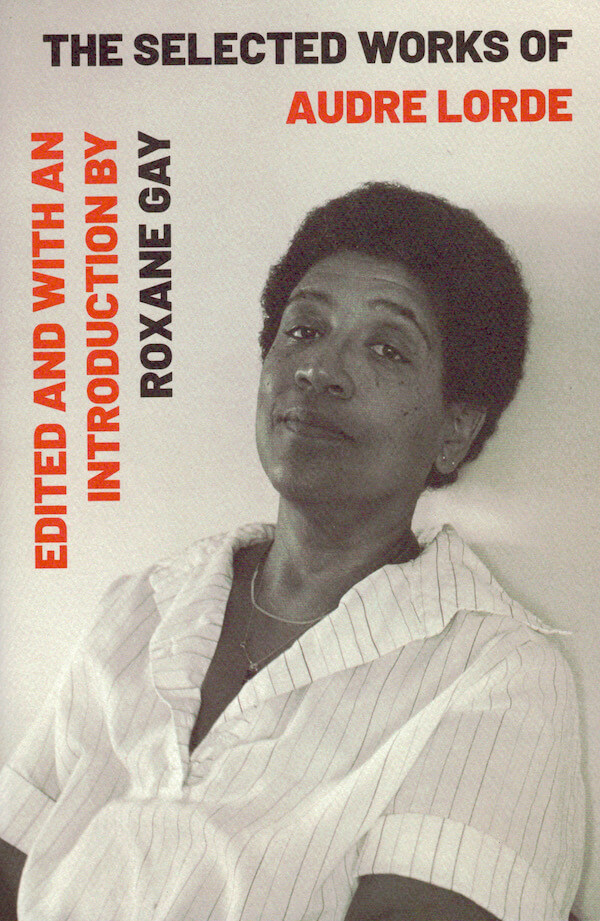
Selected Works of Audre Lorde
A definitive selection of prose and poetry from the self-described "black, lesbian, mother, warrior, poet," for a new generation of readers. Audre Lorde is an unforgettable voice in twentieth-century literature, one of the first to center the experiences of black, queer women. Her incisive essays and passionate poetry-alive with sensuality, vulnerability, and rage-remain indelible contributions to intersectional feminism, queer theory, and critical race studies.
This essential reader showcases twelve landmark essays and more than sixty poems, selected and introduced by one of our most powerful contemporary voices on race and gender, Roxane Gay.
The essays include "The Master's Tools Will Never Dismantle the Master's House," "I Am Your Sister," and excerpts from the National Book Award-winning A Burst of Light. The poems are drawn from Lorde's nine volumes, including National Book Award nominee The Land Where Other People Live. As Gay writes in her astute introduction, The Selected Works of Audre Lorde celebrates "an exemplar of public intellectualism who is as relevant in this century as she was in the last."

King Kong Theory
Out of print for far too long, writer and filmmaker Virginie Despentes's autobiographical feminist manifesto is back in an improved English translation: "blistering with anger, and so precisely phrased that it feels an injustice to summarize it" (Nadja Spiegelman, New York Review of Books).
I write from the realms of the ugly, for the ugly, the old, the bull dykes, the frigid, the unfucked, the unfuckable, the hysterics, the freaks, all those excluded from the great meat market of female flesh. And if I'm starting here it's because I want to be crystal clear: I'm not here to make excuses, I'm not here to bitch. I wouldn't swap places with anyone because being Virginie Despentes seems to me a more interesting gig than anything else out there.
Powerful, provocative, and personal, King Kong Theory is a candid account of how the author of Baise-Moi and Vernon Subutex came to be Virginie Despentes. Drawing from personal experience, Despentes shatters received ideas about rape and prostitution, and explodes common attitudes about sex and gender.
An autobiography, a call for revolt, a manifesto for a new punk feminism, King Kong Theory is Despentes's most beloved and reviled work, and is here made available again in a brilliant new translation by Frank Wynne.
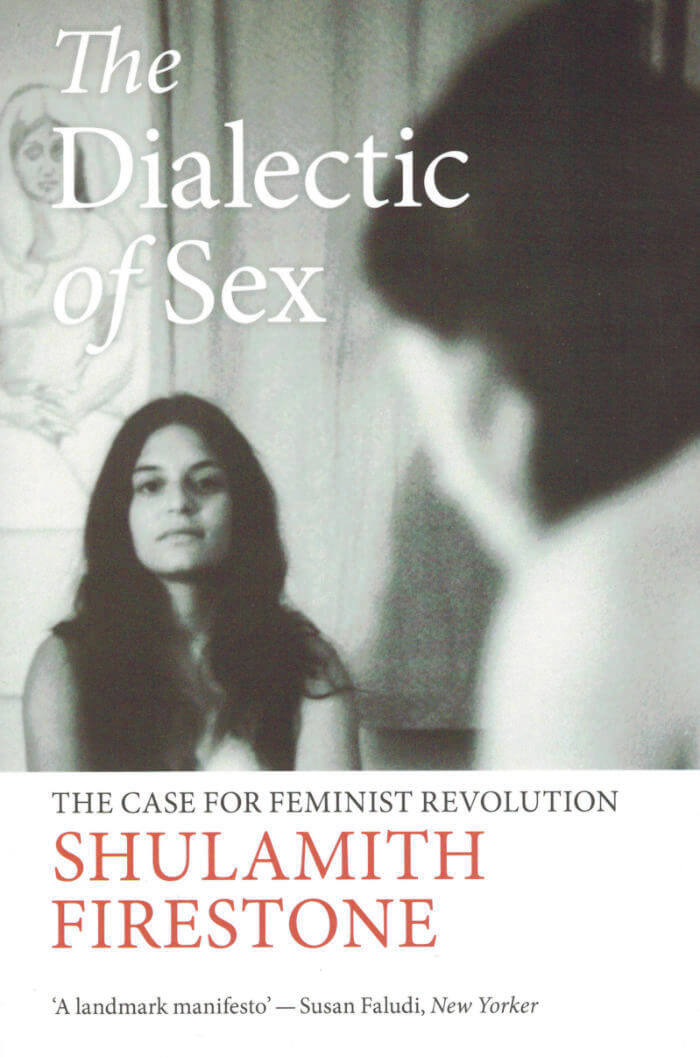
The Dialectic of Sex
An international bestseller, originally published in 1970, when Shulamith Firestone was just twenty-five years old, The Dialectic of Sex was the first book of the women’s liberation movement to put forth a feminist theory of politics.
Beginning with a look at the radical and grassroots history of the first wave (with its foundation in the abolition movement of the time), Firestone documents its major victory, the expansion of the franchise in 1920, and the fifty years of ridicule that followed. She goes on to deftly synthesize the work of Freud, Marx, de Beauvoir, and Engels to create a cogent argument for feminist revolution.
Ultimately she presents feminism as the key radical ideology, the missing link between Marx and Freud, uniting their visions of the political and the personal. The Dialectic of Sex remains remarkably relevant today—a testament to Firestone’s startlingly prescient vision. The author died in 2012, but her ideas live on through this extraordinary book.
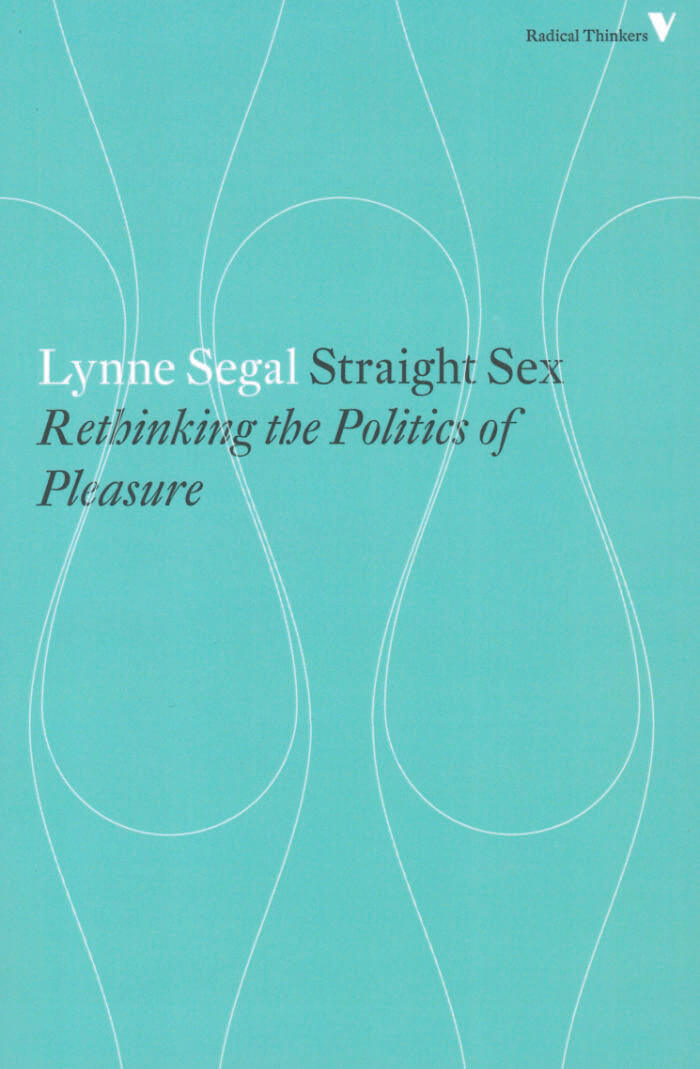
Straight Sex: Rethinking the Politics of Pleasure
A manifesto of sexual liberation, from the leading feminist thinker.
Is heterosexual sex inherently damaging to women? This is the central question of Straight Sex, Lynne Segal’s account of twenty-five years of feminist thinking on sexuality. Covering the thought of sixties-era sexual liberationists, alongside the ensuing passionate debates over sex and love within feminist and lesbian communities, Segal covers certain shifts toward greater sexual conservatism in the eighties. Straight Sex examines an array of issues, including sex as a subversive activity, the “liberated orgasm,” sex advice literature, gender uncertainties, queer politics, anti-pornography campaigns and the rise of the moral right.

The Return of the Political
In this work, Mouffe argues that liberal democracy misunderstands the problems of ethnic, religious and nationalist conflicts because of its inadequate conception of politics. He suggests that the democratic revolution may be jeopardized by a lack of understanding of citizenship, community and pluralism. Mouffe examines the work of Schmidt and Rawls and explores feminist theory, in an attempt to place the project of radical and plural democracy on a more adequate foundation than is provided by liberal theory.

The Rise and Decline of Patriarchal Systems
In this groundbreaking new work, Nancy Folbre builds on a critique and reformulation of Marxian political economy, drawing on a larger body of scientific research, including neoclassical economics, sociology, psychology, and evolutionary biology, to answer the defining question of feminist political economy: why is gender inequality so pervasive? In part, because of the contradictory effects of capitalist development: on the one hand, rapid technological change has improved living standards and increased the scope for individual choice for women; on the other, increased inequality and the weakening of families and communities have reconfigured gender inequalities, leaving caregivers particularly vulnerable.
The Rise and Decline of Patriarchal Systems examines why care work is generally unrewarded in a market economy, calling attention to the non-market processes of childbearing, childrearing and the care of other dependents, the inheritance of assets, and the use of force and violence to appropriate both physical and human resources. Exploring intersecting inequalities based on class, gender, age, race/ethnicity, and citizenship, and their implications for political coalitions, it sets a new feminist agenda for the twenty-first century.

Tomb(e)
"In 1968-69 I wanted to die, that is to say, stop living, being killed, but it was blocked on all sides," wrote Hélène Cixous, esteemed French feminist, playwright, philosopher, literary critic, and novelist. Instead of suicide, she began to dream of writing a tomb for herself. This tomb became a work that is a testament to Cixous's life and spirit and a secret book, the first book she ever authored. Originally written in 1970, Tombe is a Homerian recasting of Shakespeare's Venus and Adonis in the thickets of Central Park, a book Cixous provocatively calls the "all-powerful-other of all my books, it sparks them off, makes them run, it is their Messiah."
Masterfully translated by Laurent Milesi, Tombe preserves the sonic complexities and intricate wordplay at the core of Cixous's writing, and reveals the struggles, ideas, and intents at the center of her work. With a new prologue by the author, this is a necessary document in the development of Cixous's aesthetic as a writer and theorist, and will be eagerly welcomed by readers as a crucial building block in the foundation of her later work .
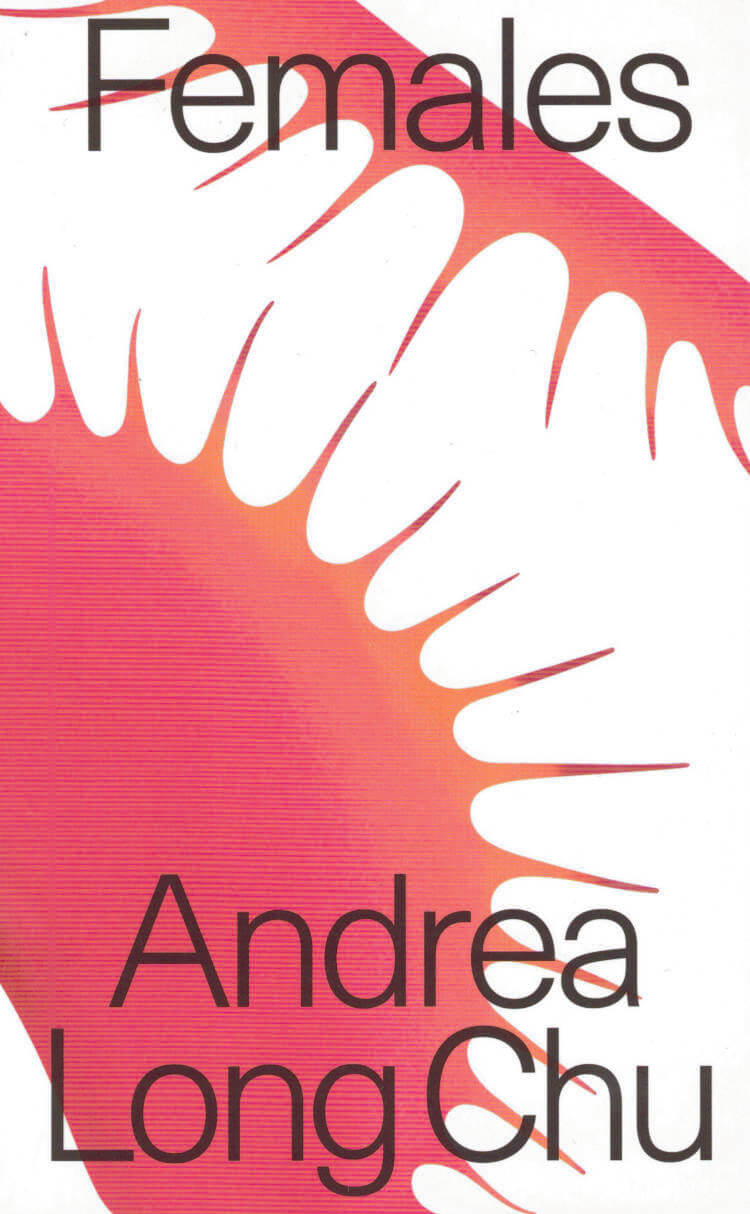
Females
Females is Andrea Long Chu's genre-defying investigation into sex and lies, desperate artists and reckless politics, the smothering embrace of gender and the punishing force of desire.
Drawing inspiration from a forgotten play by Valerie Solanas—the woman who wrote the SCUM Manifesto and shot Andy Warhol—Chu aims her searing wit and surgical intuition at targets ranging from performance art to psychoanalysis, incels to porn. She even has a few barbs reserved for feminists like herself. Each step of the way, she defends the indefensible claim that femaleness is less a biological state and more a fatal existential condition that afflicts the entire human race— men, women, and everyone else. Or maybe she's just projecting.
A thrilling new voice who has been credited with launching the "second wave" of trans studies, Chu shows readers how to write for your life, baring her innermost self with a morbid sense of humor and a mordant kind of hope.

Symbiotic Planet: A New Look at Evolution
Although Charles Darwin's theory of evolution laid the foundations of modern biology, it did not tell the whole story. Most remarkably, The Origin of Species said very little about, of all things, the origins of species. Darwin and his modern successors have shown very convincingly how inherited variations are naturally selected, but they leave unanswered how variant organisms come to be in the first place.
In Symbiotic Planet, renowned scientist Lynn Margulis shows that symbiosis, which simply means members of different species living in physical contact with each other, is crucial to the origins of evolutionary novelty. Ranging from bacteria, the smallest kinds of life, to the largest, the living Earth itself, Margulis explains the symbiotic origins of many of evolution's most important innovations.
The very cells we're made of started as symbiotic unions of different kinds of bacteria. Sex, and its inevitable corollary, death, arose when failed attempts at cannibalism resulted in seasonally repeated mergers of some of our tiniest ancestors. Dry land became forested only after symbioses of algae and fungi evolved into plants. Since all living things are bathed by the same waters and atmosphere, all the inhabitants of Earth belong to a symbiotic union. Gaia, the finely tuned largest ecosystem of the Earth's surface, is just symbiosis as seen from space.
Along the way, Margulis describes her initiation into the world of science and the early steps in the present revolution in evolutionary biology; the importance of species classification for how we think about the living world; and the way academic apartheid can block scientific advancement. Written with enthusiasm and authority, this is a book that could change the way you view our living Earth.
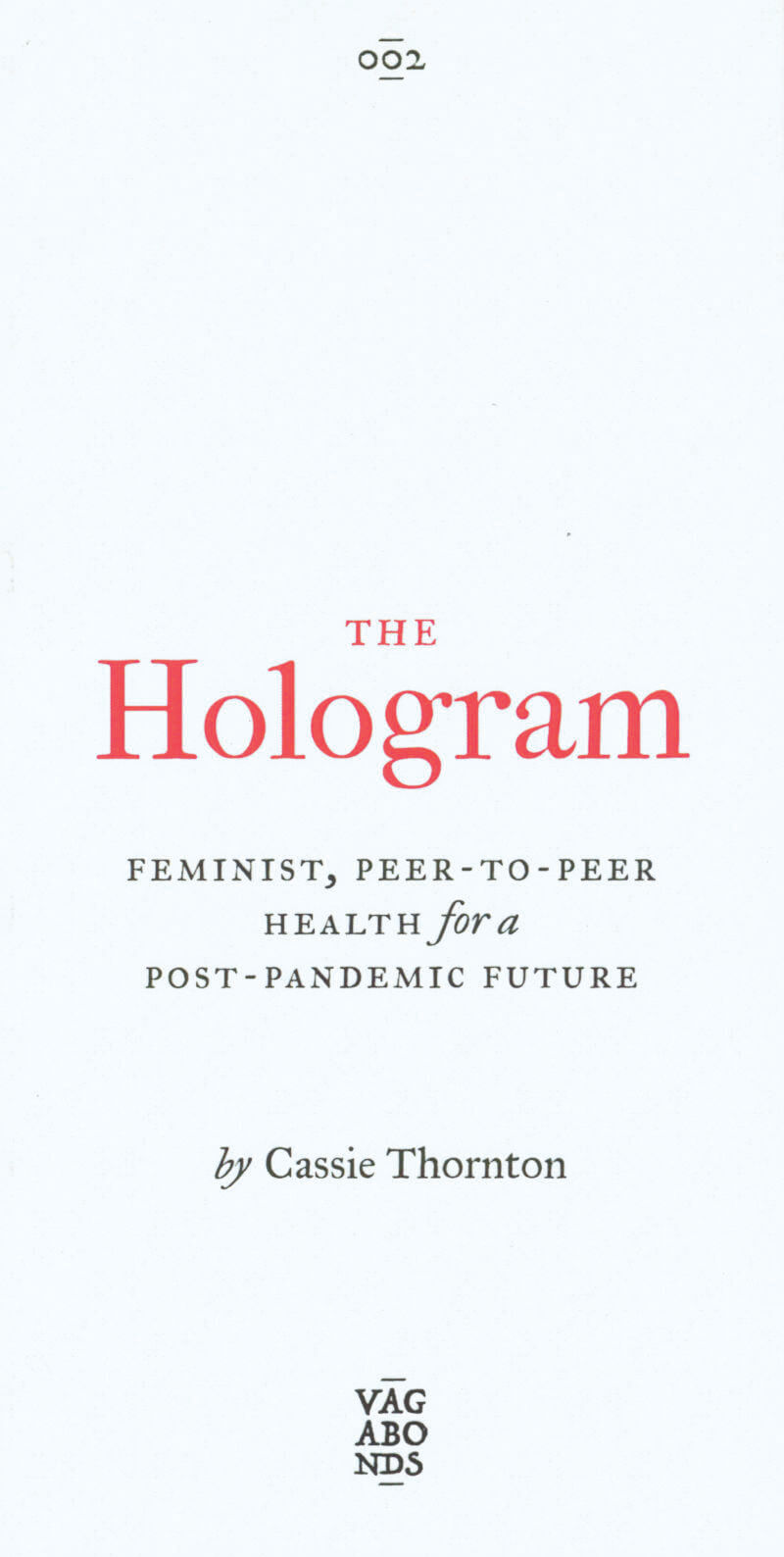
The Hologram: Feminist, Peer-To-Peer Health for a Post-Pandemic Future
In an era when capitalism leaves so many to suffer and to die, with neoliberal 'self-care' offering little more than a bandaid, how can we take health and care back into our hands? In The Hologram, Cassie Thornton puts forward a bold vision for revolutionary care: a viral, peer-to-peer feminist health network. The premise is simple: three people - a 'triangle' - meet on a regular basis, digitally or in person, to focus on the physical, mental and social health of a fourth - the 'hologram'. The hologram, in turn, teaches their caregivers how to give and also receive care; each member of their triangle becomes a hologram for another, different triangle, and so the system expands. Drawing on radical models developed in the Greek solidarity clinics during a decade of crisis, and directly engaging with discussions around mutual aid and the coronavirus pandemic, The Hologram develops the skills and relationships we desperately need for the anti-capitalist struggles of the present, and the post-capitalist society of the future. One part art, one part activism, one part science fiction, this book offers the reader a guide to establishing a Hologram network as well as reflections on this cooperative work in progress.
Cassie Thornton is an artist and activist from the US, currently living in Canada. She refers to herself as a feminist economist, a title that frames her work as that of a social scientist actively preparing for the economics of a future society that produces health and life without the tools that reproduce oppression, like money, police or prisons.

Women, the New York School, and Other True Abstractions
"Nelson's revision of the New York School makes it not only more diverse but also more resistant of defining tropes. By showing how a motley collection of poets and artists defied the gendered conventions of both the aesthetic status quo and the so-called experimental, Nelson restores the avant-garde to its raison d'etre: to lead us past orthodoxy to discovery."—Modern Painters
"Nelson has produced the kind of boundary-busting scholarship perhaps most likely to push the field toward greater clarity concerning its parameters, urgent questions, and dramatis personae."—American Literature
“After decades of listening (enthralled, of course) to the knitted ribbon-dress observations of John Ashbery, Frank O’Hara, and James Schuyler, finally, the other serious ladies of the necessarily ‘so-called’ New York School—Joan Mitchell, Barbara Guest, Bernadette Mayer, Alice Notley, and Eileen Myles—are invited to give their full-throated response. Smart as a whip and fun as an after-hours bar, Maggie Nelson gets fresh with heretofore queerly ignored matters poetic, aesthetic, and feminist. Rearranging the school’s classroom seating, illuminating details, all the while demonstrating how crucial not-caring is to care, Nelson remaps the ‘one flow’ of poetry. Let me be blunt: reading her bravura study’s like spying Joan Jett taking Helen Vendler for a joyride.”—Bruce Hainley
“This is a terrific and necessary book. . . . Maggie Nelson charts new paths for work on the New York School and on postwar experimental writing, and her book will be necessary reading for anyone working in the area—it will reach poets and other writers, visual artists, and scholars interested in the New York School and in avant-garde or experimental work; it will reach readers interested in women’s contributions to the arts, urban culture, and the history of New York City.”—Susan Rosenbaum, University of Georgia, author, Professing Sincerity: Modern Lyric Poetry, Commercial Culture, and the Crisis in Reading
“So many times over the years I’ve been asked, What’s it like to be a woman in rock music? It’s always been sort of a paralyzing question—to answer it is to give the question itself meaning. Maggie Nelson here opens it all up for examination with this incredibly timely and astute book.”—Kim Gordon of Sonic Youth
“Maggie Nelson is deft and revelatory in bringing sociological as well as psychological, stylistic, and political insights to bear on her title terms, ‘women’ and ‘the New York School.’ She lays bare an obscured history, performs imaginative and incisive readings of careers as well as books and poems, and foots her way with exciting skill through the overlapping minefields of professional, national, and sexual politics.”—Eve Kosofsky Sedgwick, author, A Dialogue on Love
In this whip-smart study, Maggie Nelson provides the first extended consideration of the roles played by women in and around the New York School of poets, from the 1950s to the present, and offers unprecedented analyses of the work of Barbara Guest, Bernadette Mayer, Alice Notley, Eileen Myles, and abstract painter Joan Mitchell as well as a reconsideration of the work of many male New York School writers and artists from a feminist perspective.
With contagious enthusiasm, Women, the New York School, and Other True Abstractions ranges widely and covers collaborations between poets and painters in the 1950s and 1960s; the complex role played by the “true abstraction” of the feminine in the work of John Ashbery, Frank O’Hara, and James Schuyler; the intricate weave of verbal and visual arts throughout the postwar period, from Abstract Expressionism to Pop to Conceptualism to feminist and queer performance art; and the unfolding, diverse careers of Mayer, Notley, and Myles from the 1970s to the present. Along the way, Nelson considers provocative questions of anonymity and publicity, the solitary and the communal, the enduring and the ephemeral, domesticity, boredom, sex, and politics.
By asking us to rethink the ways in which we conceptualize “schools” and “avant-gardes” and eventually drawing our attention to larger, compelling questions about how and why we read—and how gender and sexuality inform that reading in the first place—Maggie Nelson not only fills an important gap in the history of American poetry and art but also gives an inspired performance of the kind of lively, audacious, and personally committed criticism that befits her subject.
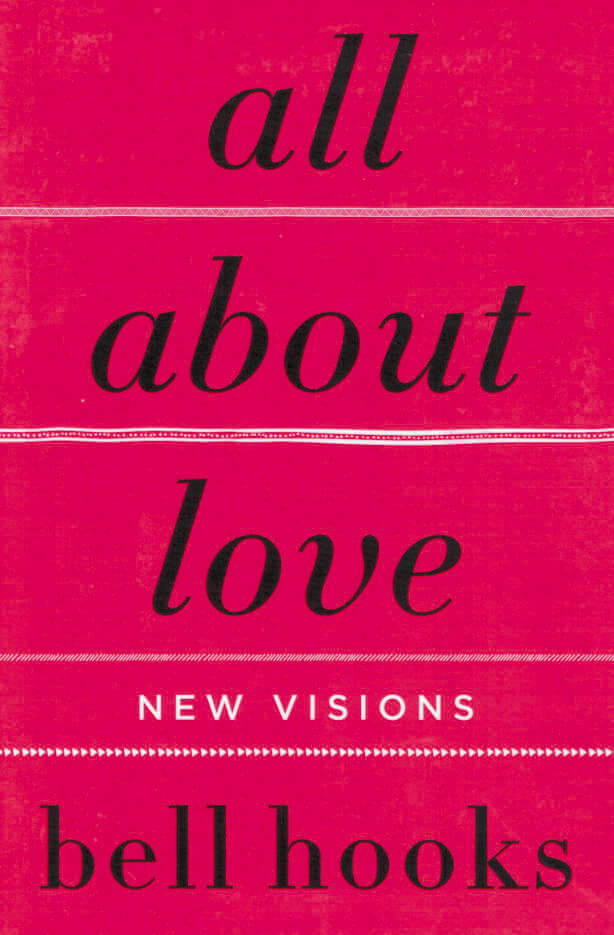
All About Love: New Visions
The acclaimed first volume in feminist icon bell hooks' Love Song to the Nation, All About Love is a revelation about what causes a polarized society and how to heal the divisions that cause suffering. Here is the truth about love, and inspiration to help us instill caring, compassion, and strength in our homes, schools, and workplaces.
"The word 'love' is most often defined as a noun, yet we would all love better if we used it as a verb," writes bell hooks as she comes out fighting and on fire in All About Love. Here, at her most provocative and intensely personal, renowned scholar, cultural critic and feminist bell hooks offers a proactive new ethic for a society bereft with lovelessness—not the lack of romance, but the lack of care, compassion, and unity. People are divided, she declares, by society's failure to provide a model for learning to love.
As bell hooks uses her incisive mind to explore the question "What is love?" her answers strike at both the mind and heart. Razing the cultural paradigm that the ideal love is infused with sex and desire, she provides a new path to love that is sacred, redemptive, and healing for individuals and for a nation. The Utne Reader declared bell hooks one of the "100 Visionaries Who Can Change Your Life." All About Love is a powerful, timely affirmation of just how profoundly her revelations can change hearts and minds for the better.

More-than-Human
Lucia Pietroiusti, Marina Otero Verzier and 1 more
The More-than-Human reader brings together texts that reflect on the state of post-anthropocentric thinking today, by writers from a wide range of disciplines. Focusing on the ecologies and technologies of climate injustice and inequalities, as well as the destructive structures lurking within anthropocentrism, More-than-Human proposes complex entanglements, frictions, and reparative attention across species and beings.
Thinking past the centrality of the human subject, the texts that compose this reader begin to imagine networks of ethics and responsibility emerging not from the ideologies of old, but from the messy and complex liveliness around and beneath us.
Rather than attempting to be a comprehensive compendium on the topic (which would be virtually impossible), More-than-Human provides a cross-section of the breadth and vitality of a literary, scientific, and conceptual milieu where multiple strands of work intersect even as they are frequently regarded as belonging to separate disciplinary discourses.
Contributors: Stacy Alaimo, Ramon Amaro, Karen Barad, Rosi Braidotti, Octavia Butler, Georges Canguilhem, Marisol de la Cadena, NASA History Department, Silvia Federici, Scott F. Gilbert, Édouard Glissant, Jack Halberstam, Donna Haraway, Myra J. Hird, Kristina Lyons, Patricia MacCormack, John T. Maher, Michael Marder, Timothy Mitchell, Reza Negarastani, Jussi Parikka, Elizabeth Povinelli, Paul B. Preciado, María Puig de la Bellacasa, Filipa Ramos, Isabelle Stengers, Elly R. Truitt, Anna L. Tsing, Eduardo Vivieros de Castro, Jason Wallin, Kathryn Yusoff and Joanna Zylinska.
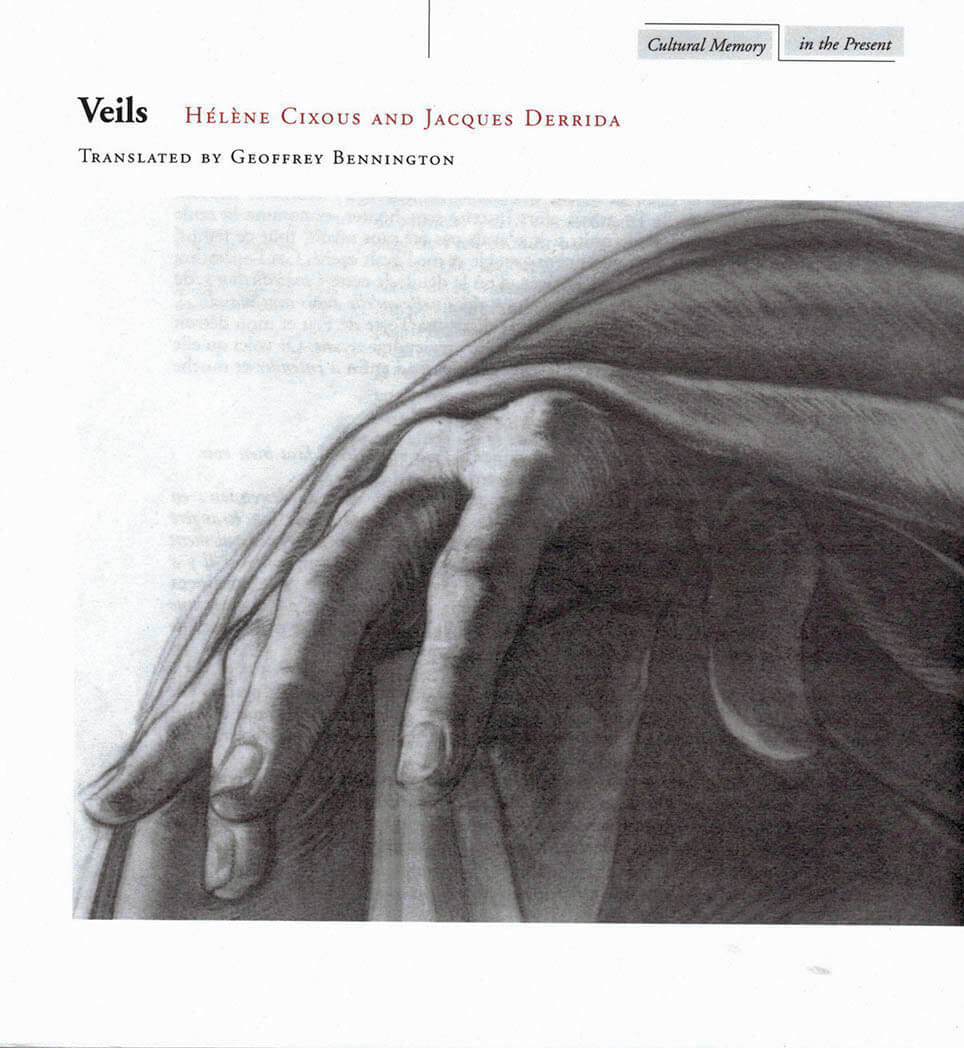
Veils
Hélène Cixous, Jacques Derrida
This book combines loosely "autobiographical" texts by two of the most influential French intellectuals of our time. "Savoir," by Hélène Cixous is an account of her experience of recovered sight after a lifetime of severe myopia; Jacques Derrida's "A Silkworm of One's Own" muses on a host of motifs, including his varied responses to "Savoir."
Hélène Cixous is Professor of Literature and Director of the Centre d'Etudes Feminines, Paris VIII. Jacques Derrida is Director of Studies at the Ecole des Hautes Etudes en Sciences Sociales, Paris, and Professor of Humanities at the University of California, Irvine. Stanford has published nine of his books, most recently Of Hospitality, which also includes a text by Anne Dufourmantelle (Stanford, 20

Manifestly Haraway
Electrifying, provocative, and controversial when first published thirty years ago, Donna Haraway's "Cyborg Manifesto" is even more relevant today, when the divisions that she so eloquently challenges—of human and machine but also of gender, class, race, ethnicity, sexuality, and location—are increasingly complex. The subsequent "Companion Species Manifesto," which further questions the human-nonhuman disjunction, is no less urgently needed in our time of environmental crisis and profound polarization.
Manifestly Haraway brings together these momentous manifestos to expose the continuity and ramifying force of Haraway's thought, whose significance emerges with engaging immediacy in a sustained conversation between the author and her long-term friend and colleague Cary Wolfe. Reading cyborgs and companion species through and with each other, Haraway and Wolfe join in a wide-ranging exchange on the history and meaning of the manifestos in the context of biopolitics, feminism, Marxism, human-nonhuman relationships, making kin, literary tropes, material semiotics, the negative way of knowing, secular Catholicism, and more.
The conversation ends by revealing the early stages of Haraway's "Chthulucene Manifesto," in tension with the teleologies of the doleful Anthropocene and the exterminationist Capitalocene. Deeply dedicated to a diverse and robust earthly flourishing, Manifestly Haraway promises to reignite needed discussion in and out of the academy about biologies, technologies, histories, and still possible futures.
Donna J. Haraway is distinguished professor emerita in the History of Consciousness Department at the University of California, Santa Cruz, where she is also affiliated with the departments of anthropology, feminist studies, environmental studies, and film and digital media. She is an active participant in UCSC's Science and Justice Research Center and the Center for Cultural Studies.
Published 2016
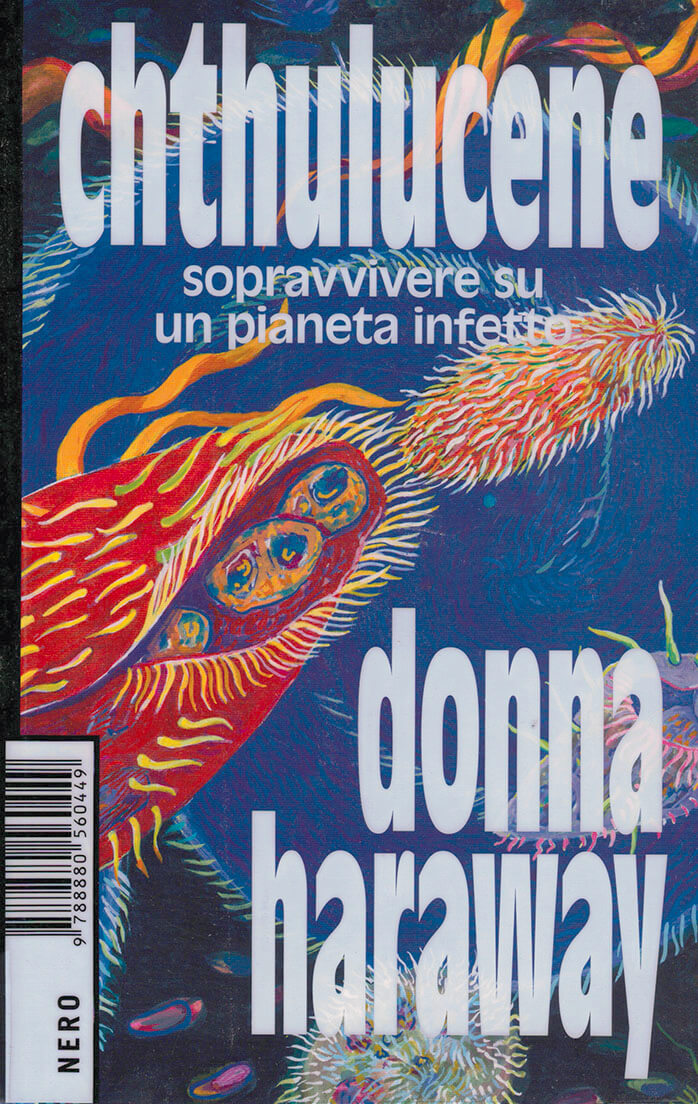
CHTHULUCENE
Italian edition
Cosa succede quando il genere umano, dopo aver irrimediabilmente alterato gli equilibri del pianeta Terra, smette di essere il centro del mondo? E nel pieno della crisi ecologica, che relazioni è possibile recuperare non solo tra individui umani, ma tra tutte le specie che il pianeta lo abitano? In questo testo denso ed emozionante, scritto in una lingua immaginifica che si ispira tanto alla fantascienza quanto alla grande lezione del femminismo radicale, Donna Haraway ci ricorda che tutto è interconnesso, tutto è contaminato, tutto ci riguarda. Contro i semplicismi delle discussioni sull’antropocene, Chthulucene immortala la centralità di Donna Haraway tra i più importanti e originali pensatori del nostro tempo.

Caccia alle streghe, guerra alle donne
La caccia alle streghe è tornata scatenare nel XXI secolo una nuova ondata di violenza, interpersonale e istituzionale, contro le donne. E anche oggi, come nel Medioevo, questa violenza misogina che demonizza la donna procede di pari passo con l’accumulazione capitalistica, che si sviluppa attraverso processi di espropriazione e distruzione dei rapporti di solidarietà e potere che regolano la vita delle comunità.
Silvia Federici esamina le cause profonde della guerra in atto, fatta non solo di violenza domestica e sessuale, ma anche economica e strutturale, il cui esito è ancora una volta quello di sovvertire i processi di riproduzione sociale per spaccare le comunità e aprire la strada all’individualismo funzionale al progetto neoliberista. Caccia alle streghe, guerra alle donne è un’indagine sulle cause di questa nuova violenza e una chiamata femminista alle armi, che attraverso la memoria e l’analisi del passato offre spunti inediti per le lotte a venire.
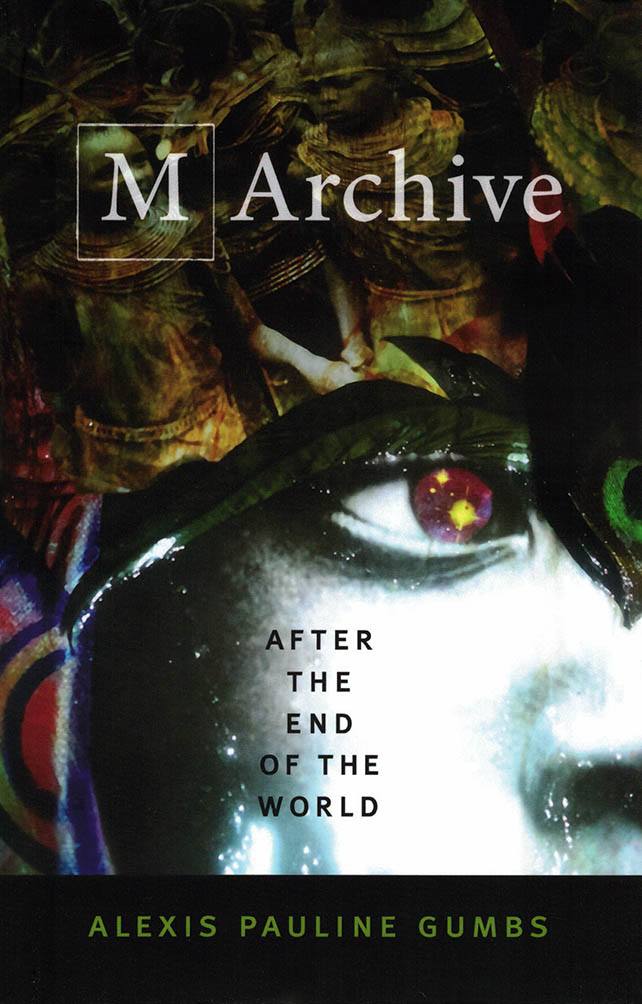
M Archive: After the End of the World
Following the innovative collection Spill, Alexis Pauline Gumbs's M Archive, the second book in a planned experimental triptych, is a series of poetic artifacts that speculatively documents the persistence of Black life following a worldwide cataclysm.
Engaging with the work of the foundational Black feminist theorist M. Jacqui Alexander, and following the trajectory of Gumbs's acclaimed visionary fiction short story "Evidence," M Archive is told from the perspective of a future researcher who uncovers evidence of the conditions of late capitalism, antiblackness, and environmental crisis while examining possibilities of being that exceed the human.
By exploring how Black feminist theory is already after the end of the world, Gumbs reinscribes the possibilities and potentials of scholarship while demonstrating the impossibility of demarcating the lines between art, science, spirit, scholarship, and politics.
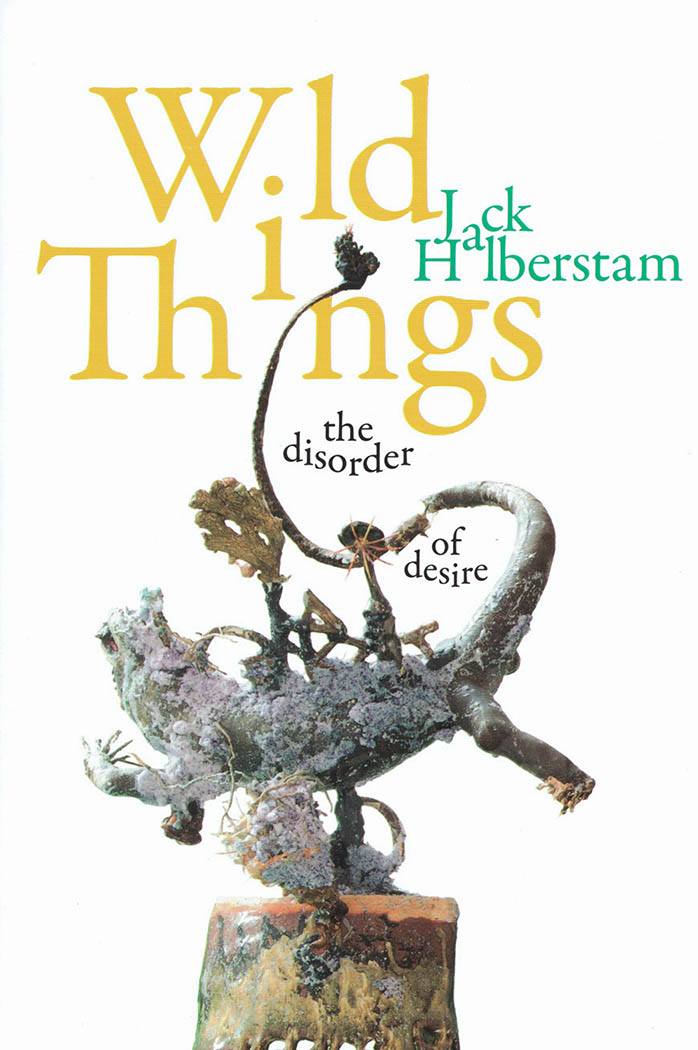
Wild Things: The Disorder of Desire
Halberstam offers an alternative history of sexuality by tracing the ways in which the wild, a space located beyond normative borders of sexuality, offers sources of opposition to knowing and being that transgress Euro-American notions of the modern subject.
"WILD THINGS is queer theorist Jack Halberstam's account of sexuality in general, and queerness in particular, after nature. As the heterosexual/homosexual binary emerged in the late 19th-century and coalesced in the 20th-century, discourses of both heterosexuality and homosexuality defined sexuality in relation to nature and the natural world. The most well-known is the homophobic framing of homosexuality as unnatural, aberrant, and "against" nature, but of equal importance is the 19th-century male dandy's positioning of artifice and camp-and through it homosexuality-as anti-natural. On the other hand, heterosexuality was often held up as the "natural" sexuality and, later in the 20th-century, gay scientists tried to prove that homosexuality was a natural, biological desire.
In this book, Halberstam mobilizes wildness as an analytic through which an alternative history of sexuality and desire outside of heterosexuality, homosexuality, and taxonomical classifications can emerge. To that end, Halberstam turns back to the orderly, taxonomical, and classified homosexuality and heterosexuality of the 19th and 20th-centuries and asks: what embodiments and desires were swept under the carpet in the process of creating identitarian sexualities?
Halberstam claims these excluded and unruly figures as "wild" lives lived out in embodiments and desires which eluded the orderly classifications of their era. Wildness, for Halberstam, thus becomes a way to claim an "epistemology of the ferox," a way of being and knowing in the world which is not the opposition of order but order's absence: a force which "disorders desire and desires disorder."
Although he is clear that wildness and queerness are not interchangeable, Halberstam sees in wildness and "wild thought" queer theory's anti-identitarian impulse to explore life outside of the limits of the human and liberal governance. More than just a project of recuperating queer figures lost in the archive, Halberstam's WILD THINGS argues for a revision of queer history, one in which "nature" and the "natural world" does not function as that which sexuality defines itself with and against"
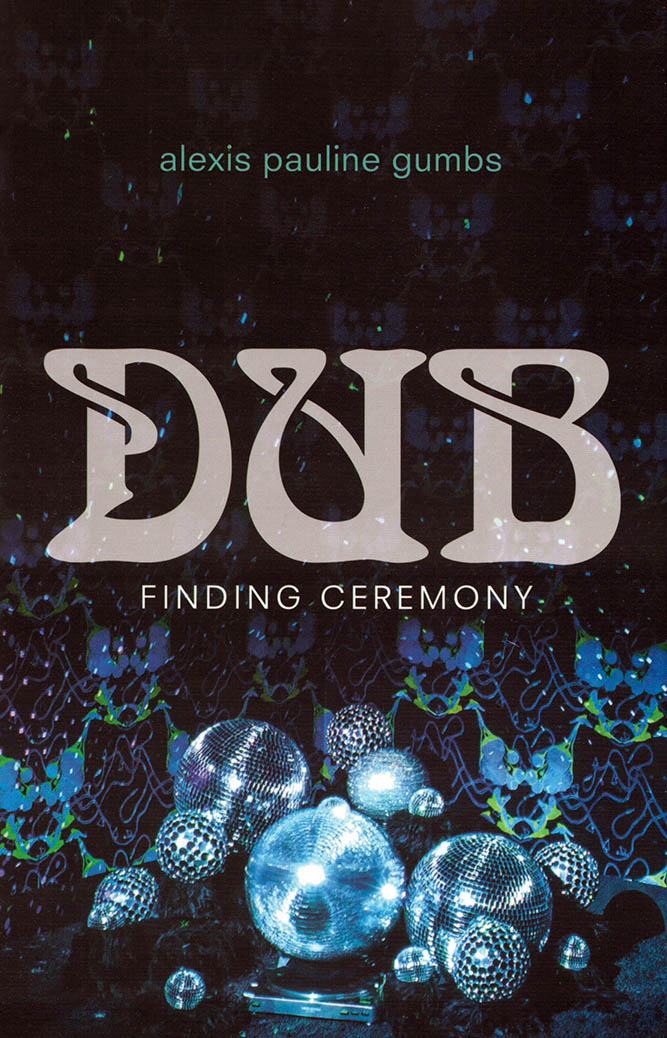
DUB
Dub: Finding Ceremony takes inspiration from theorist Sylvia Wynter, dub poetry, and ocean life to offer a catalog of possible methods for remembering, healing, listening, and living otherwise.
"In DUB Alexis Pauline Gumbs continues with the third book in her poetry series, the first two books being Spill, inspired by Hortense Spillers, and M Archive, inspired by Jacqui Alexander. Whereas Spill deals with the contemporary afterlives of slavery and M Archive describes the post-dated evidence of our imminent apocalypse, DUB destroys Gumbs' own origin story, as she questions the assumptions and histories she has held onto most of her life. This text, through engagement with Sylvia Wynter's rigor, reinvents language outside of personal histories.
DUB is organized into topical sections, where spacious prose poems animate the voice of an underwater chorus in ceremonies that flow into one another. Beginning a daily writing practice, Gumbs wrote DUB based on moments of emphasis in Sylvia Wynter's essays (and one interview over several decades).
This book is influenced by the promiscuity and prolificity of dub music, the confrontational home-grown intimacy of dub poetry, and the descendants of this work. Dub uses the impact of repetition and the incantatory power of the spoken broken word. Gumbs uses dub to emphasize that Sylvia Wynter learned every colonial language and came to the conclusion that the ways of thinking that made colonialism and slavery imaginable were constructed over time and heretical to the ways of thinking that came before them; and so it must be possible to construct ways to understand life and place differently now as well.
Gumbs goes back to the origin stories that precede her and turns the blood into paint, emphasizing that "then" is also "now" through the broken and intense voices of ancestors. Inspired by Wynter's heretical poetic action against our deepest beliefs, DUB is an artifact and tool for breath retraining and interspecies ancestral listening.
Throughout the text, listening includes speakers who have never been considered human: whales and algae. Gumbs is attentive to kindred beyond taxonomy, questioning kinship loyalty, and suggests that our perceived survival needs are responses to a story we made up and told ourselves was written by our genes, a story that can be changed. This book will be of interest to scholars of African-American studies, diaspora studies, feminism, queer theory, English, creative writing and poetry"
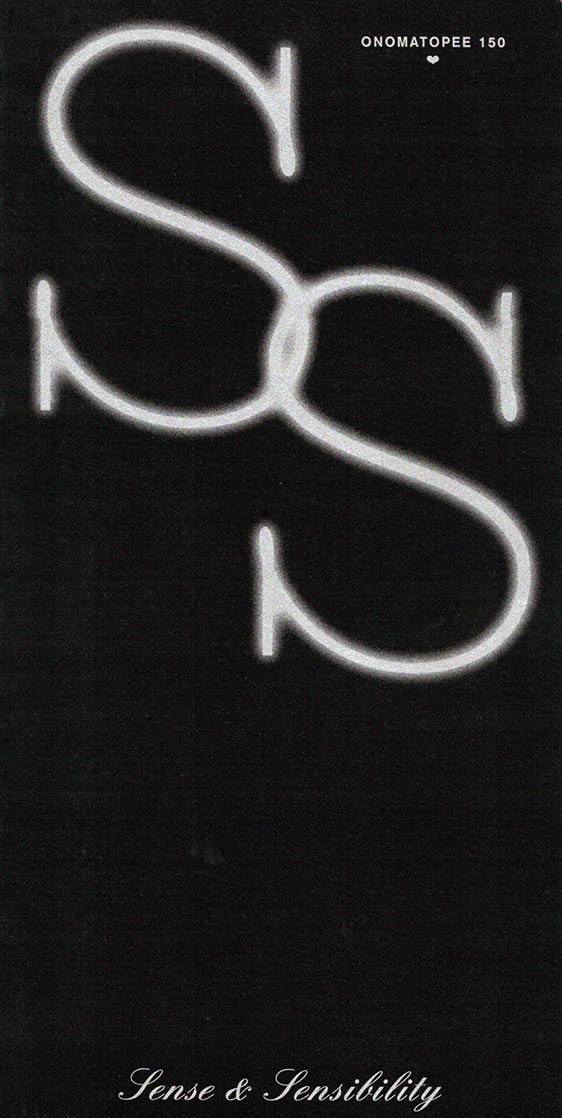
Sense & Sensibility
It’s because feminism has become a fashionable commodity now, that we’re in desperate need of a more inclusive and varied reflection on contemporary girlhood, gender equality struggles, and the relationship between gender, politics and philosophy.
This book documents the production and thought processes of 6 engaging artists and designers regarding the theme, and features a collection of essays by artists and academics, writers and rioteers, curators and journalists.
With contributions by Mandy Roos, Gabriel A. Maher with Roberto Pérez de Gayo and Carly Rose Bedford, Olle Lundin, Janina Frye, Camille Auer, Barbara Bolt, Daantje Bons, Charlotte van Buylaere, Ece Canlı and Luiza Prado de O. Martins, Victoria Ledig, Alicja Melzacka, Nina Power, Barbara Smith for Nasty Women and Aynouk Tan.
Edited and curated by Pernilla Ellens
Graphic design by Virginie Gauthier
Made possible thanks to the municipality of Eindhoven and the province of Noord-Brabant.
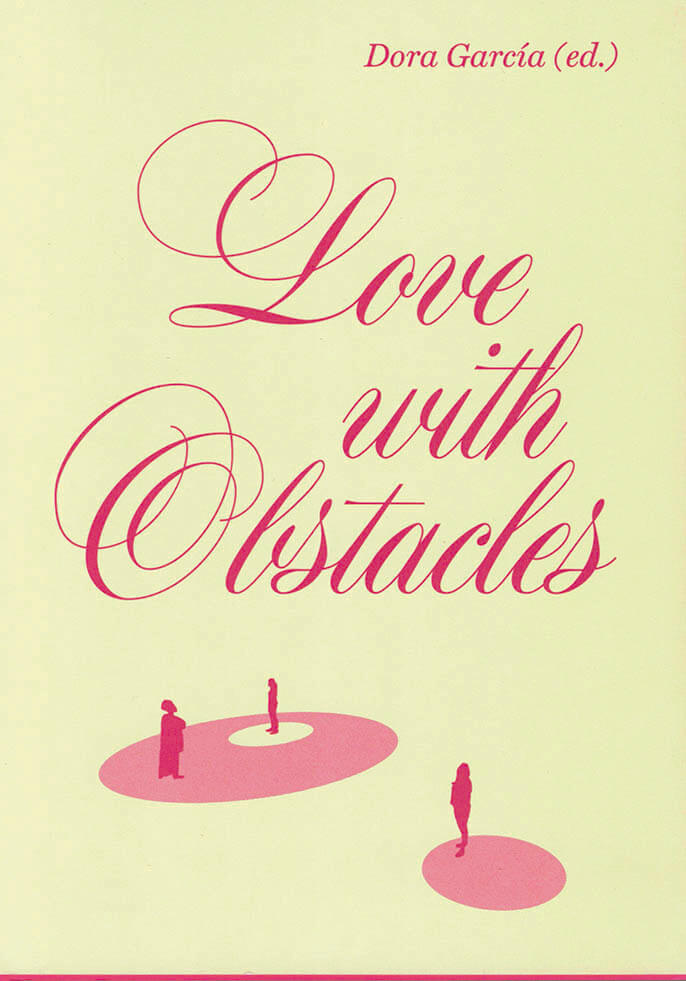
Love with Obstacles (Amor Rojo)
This is Spanish artist Dora García’s collaborative research on the life and legacy of Alexandra Kollontai (1872–1952), a socialist, activist, feminist, and intellectual. As a Soviet ambassador from 1922 to 1945, she advocated the sexual and social emancipation of women, and implemented many measures women continue to fight for today, such as legalising abortion and protecting women’s rights. Her writings found special resonance in Latin America, where her influence is still felt in contemporary feminist struggles.
The essays “On the Dragon” and “White Bird” are translated into English here for the first time, and are published alongside a selection of poems by Anna Akhmatova.

Time Binds - Queer Temporalities, Queer Histories
Time Binds is a powerful argument that temporal and sexual dissonance are intertwined, and that the writing of history can be both embodied and erotic. Challenging queer theory’s recent emphasis on loss and trauma, Elizabeth Freeman foregrounds bodily pleasure in the experience and representation of time as she interprets an eclectic archive of queer literature, film, video, and art. She examines work by visual artists who emerged in a commodified, “postfeminist,” and “postgay” world. Yet they do not fully accept the dissipation of political and critical power implied by the idea that various political and social battles have been won and are now consigned to the past. By privileging temporal gaps and narrative detours in their work, these artists suggest ways of putting the past into meaningful, transformative relation with the present. Such “queer asynchronies” provide opportunities for rethinking historical consciousness in erotic terms, thereby countering the methods of traditional and Marxist historiography. Central to Freeman’s argument are the concepts of chrononormativity, the use of time to organize individual human bodies toward maximum productivity; temporal drag, the visceral pull of the past on the supposedly revolutionary present; and erotohistoriography, the conscious use of the body as a channel for and means of understanding the past. Time Binds emphasizes the critique of temporality and history as crucial to queer politics.
Elizabeth Freeman is Associate Professor of English at the University of California, Davis. She is the author of The Wedding Complex: Forms of Belonging in Modern American Culture, also published by Duke University Press.
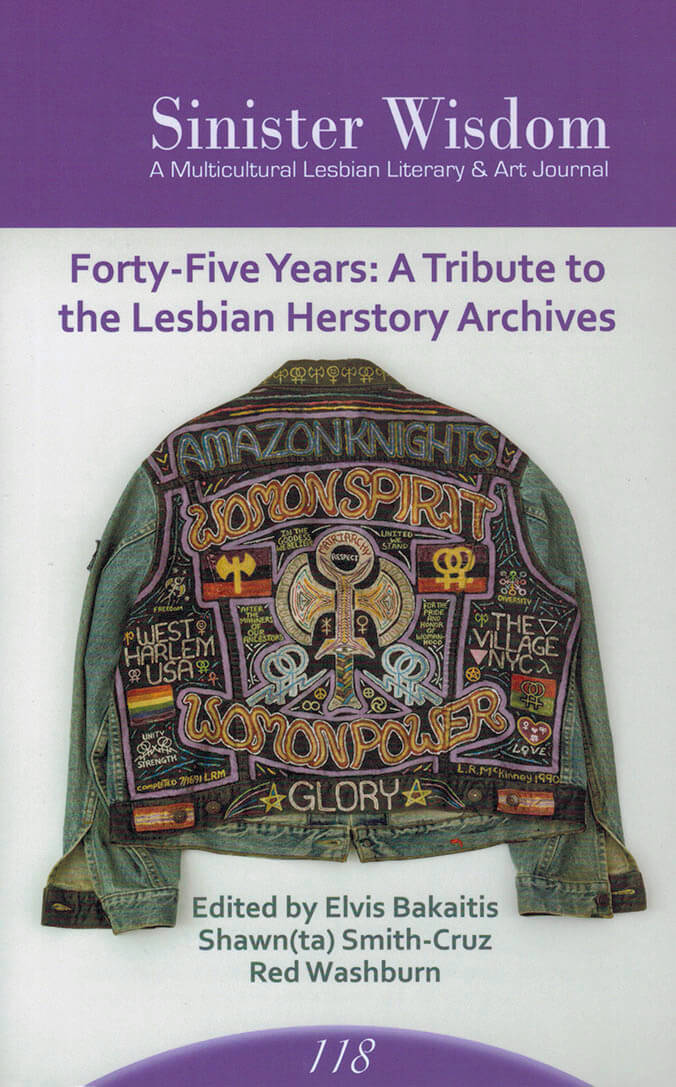
Forty-Five Years: A Tribute to the Lesbian Herstory Archives
Forty-five years ago movements of liberation made possible the birth of a new project in the world, the Lesbian Herstory Archives. In Sinister Wisdom 118 are some of the founding stories, telling what it meant to walk first into an apartment and later into a four-story limestone building, where shame became history, secrets became shared connections and complex lesbian, queer histories were enriched by maintaining intergenerational community.
A grassroots collection, the Archives was intentional about engaging with all facets and complexities of lesbian life, inclusive of diversity in race and gender-identity, from the bar life of the fifties and before, to the lesbian-feminist cultural richness of the mid-twentieth century and beynd, to the gender richness of the tweny-first. This issue honors an Archives that articulates the complexities of how lesbians make our way in the world.